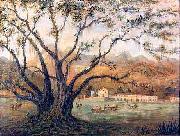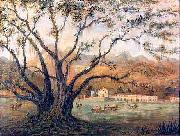
|
Friedrich Hagedorn
|
|||
|
|
|||
| (23 April 1708 - 28 October 1754), German poet, was born at Hamburg, where his father, a man of scientific and literary taste, was Danish minister. He was educated at the gymnasium of Hamburg, and later (1726) became a student of law at Jena. Returning to Hamburg in 1729, he obtained the appointment of unpaid private secretary to the Danish ambassador in London, where he lived till 1731. Hagedorn's return to Hamburg was followed by a period of great poverty and hardship, but in 1733 he was appointed secretary to the so-called "English Court" (Englischer Hof) in Hamburg, a trading company founded in the 13th century. He shortly afterwards married, and from this time had sufficient leisure to pursue his literary occupations till his death. Hagedorn is the first German poet who bears unmistakable testimony to the nation's recovery from the devastation wrought by the Thirty Years' War. He is eminently a social poet. His light and graceful love-songs and anacreontics, with their undisguised joie de vivre, introduced a new note into the German lyric; his fables and tales in verse are hardly inferior in form and in delicate persiflage to those of his master La Fontaine, and his moralizing poetry re-echoes the philosophy of Horace. He exerted a dominant influence on the German lyric until late in the 18th century. The first collection of Hagedorn's poems was published at Hamburg shortly after his return from Jena in 1729, under the title Versuch einiger Gedichte (reprinted by A. Sauer, Heilbronn, 1883). In 1738 appeared Versuch in poetischen Fabeln und Erzählungen; in 1742 a collection of his lyric poems, under the title Sammlung neuer Oden und Lieder; and his Moralische Gedichte in 1750. A collection of his entire works was published at Hamburg in 1757 after his death. The best is J.J. Eschenburg's edition (5 vols., Hamburg, 1800). Selections of his poetry with an excellent introduction in F. Muncker's Anakreontiker und preussisch-patriotische Lyriker (Stuttgart, 1894). See also H. Schuster, F. von Hagedorn und seine Bedeutung fer die deutsche Literatur (Leipzig, 1882); W. Eigenbrodt, Hagedorn und die Erzählung in Reimversen (Berlin, 1884). | |||
|
|
|||
|
Vista da fazenda de Correias new25/Friedrich Hagedorn-784456.jpg Pintura Identificación:: 84885 |
Date 19th century Medium Oil on paper, mounted on wood panel. Dimensions 54 x 72 cm (21.3 x 28.3 in) cjr | ||
|
|
|||
|
Friedrich Hagedorn
|
|||
|
|
|||
| (23 April 1708 - 28 October 1754), German poet, was born at Hamburg, where his father, a man of scientific and literary taste, was Danish minister. He was educated at the gymnasium of Hamburg, and later (1726) became a student of law at Jena. Returning to Hamburg in 1729, he obtained the appointment of unpaid private secretary to the Danish ambassador in London, where he lived till 1731. Hagedorn's return to Hamburg was followed by a period of great poverty and hardship, but in 1733 he was appointed secretary to the so-called "English Court" (Englischer Hof) in Hamburg, a trading company founded in the 13th century. He shortly afterwards married, and from this time had sufficient leisure to pursue his literary occupations till his death. Hagedorn is the first German poet who bears unmistakable testimony to the nation's recovery from the devastation wrought by the Thirty Years' War. He is eminently a social poet. His light and graceful love-songs and anacreontics, with their undisguised joie de vivre, introduced a new note into the German lyric; his fables and tales in verse are hardly inferior in form and in delicate persiflage to those of his master La Fontaine, and his moralizing poetry re-echoes the philosophy of Horace. He exerted a dominant influence on the German lyric until late in the 18th century. The first collection of Hagedorn's poems was published at Hamburg shortly after his return from Jena in 1729, under the title Versuch einiger Gedichte (reprinted by A. Sauer, Heilbronn, 1883). In 1738 appeared Versuch in poetischen Fabeln und Erzählungen; in 1742 a collection of his lyric poems, under the title Sammlung neuer Oden und Lieder; and his Moralische Gedichte in 1750. A collection of his entire works was published at Hamburg in 1757 after his death. The best is J.J. Eschenburg's edition (5 vols., Hamburg, 1800). Selections of his poetry with an excellent introduction in F. Muncker's Anakreontiker und preussisch-patriotische Lyriker (Stuttgart, 1894). See also H. Schuster, F. von Hagedorn und seine Bedeutung fer die deutsche Literatur (Leipzig, 1882); W. Eigenbrodt, Hagedorn und die Erzählung in Reimversen (Berlin, 1884). | |||
|
|
|||
|
Vista da fazenda de Correias new25/Friedrich Hagedorn-645889.jpg Pintura Identificación:: 88733 |
19th century Medium Oil on paper, mounted on wood panel. Dimensions 54 x 72 cm (21.3 x 28.3 in) cyf | ||
|
|
|||
|
Also Buy::. For Following Paintings / Artists / Products, Please Use Our Search Online: |







